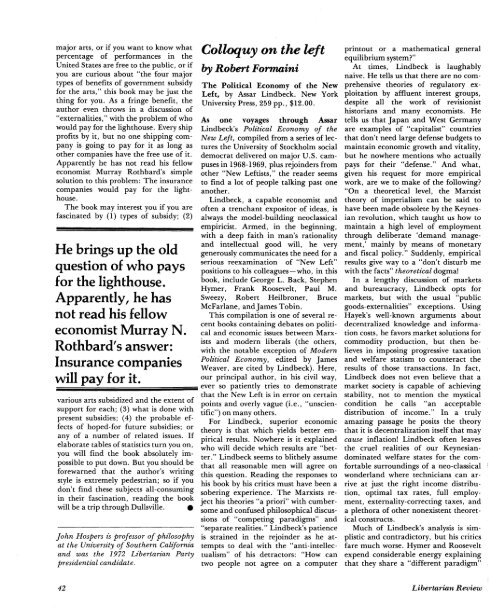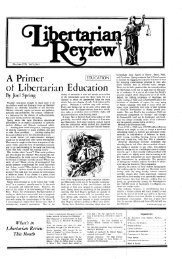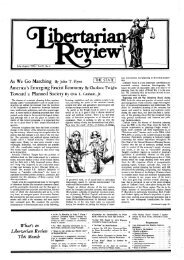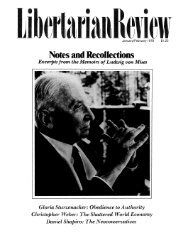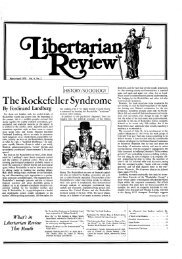The Libertarian Review July 1978 - Libertarianism.org
The Libertarian Review July 1978 - Libertarianism.org
The Libertarian Review July 1978 - Libertarianism.org
You also want an ePaper? Increase the reach of your titles
YUMPU automatically turns print PDFs into web optimized ePapers that Google loves.
major arts, or if you want to know whatpercentage of performances in theUnited States are free to the public, or ifyou are curious about "the four majortypes of benefits of government subsidyfor the arts," this book may be just thething for you. As a fringe benefit, theauthor even throws in a discussion of"externalities," with the problem of whowould pay for the lighthouse. Every shipprofits by it, but no one shipping companyis going to pay for it as long asother companies have the free use of it.Apparently he has not read his felloweconomist Murray Rothbard's simplesolution to this problem: <strong>The</strong> insurancecompanies would pay for the lighthouse.<strong>The</strong> book may interest you if you arefascinated by (1) types of subsidy; (2)John Hospers Z"S professor of phz"losophyat the Unz"versz"ty of Southern Californiaand was the 1972 <strong>Libertarian</strong> Partypresidential candidate.Colloquy on the leftby Robert Fornwini<strong>The</strong> Political Economy of the NewLeft, by Assar Lindbeck. New YorkUniversity Press, 259 pp., $12.00.As one voyages through AssarLindbeck's Polz'tz"cal Economy of theNew Left, compiled from a series of lecturesthe University of Stockholm socialdemocrat delivered on major U.S. campusesin 1968-1969, plus rejoinders fromother "New Leftists," the reader seemsto find a lot of people talking past oneanother.Lindbeck, a capable economist andoften a trenchant expositor of ideas, isalways the model-building neoclassicalempiricist. Armed, in the beginning,with a deep faith in man's rationalityH b · h ld and intellectual good will, he verye rIngs up teo generously communicates the need for aquestion of who pays serious reexamination of "New Left"positions to his colleagues- who, in thisfor the lighthouse. book, include Ge<strong>org</strong>e L. Back, StephenHymer, Frank Roosevelt, Paul M.Apparently, he has Sweezy, Robert Heilbroner, BruceMcFarlane, andJames Tobin.not read his fellowThis compilation is one of several recentbooks containing debates on politieconol11.istMurray N. cal and economic issues between Marx-Rothbard 's answer.. ists and modern liberals (the others,with the notable exception of ModernI · Polz'tz'cal Economy, edited by Jamesnsurance cOntpanIeS Weaver, are cited by Lindbeck). Here,will pay for it.our principal author, in his civil way,iiiiiiiiiiiiiiiiiiiiiiiiiiiiiiiiiiiiiiiiiiiiiiiiiiiiiiiiiiiiiiiiiiiiiiiiiiiiiiiiiiiiiiiiiiiiiiiiiiiiiiiiiiiiiij; ever so patiently tries to demonstratethat the New Left is in error on certainvarious arts subsidized and the extent ofpoints and overly vague (Le., "unscientific")on many others.support for each; (3) what is done withpresent subsidies; (4) the probable effectsof hoped-for future subsidies; orFor Lindbeck, superior economictheory is that which yields better empiricalresults. Nowhere is it explainedany of a number of related issues. Ifelaborate tables ofstatistics turn you on,who will decide which results are "better."Lindbeck seems to blithely assumeyou will find the book absolutely impossibleto put down. But you should bethat all reasonable men will agree onforewarned that the author's writingthis question. Reading the responses tostyle is extremely pedestrian; so if youhis book by his critics must have been adon't find these subjects all-consumingsobering experience. <strong>The</strong> Marxists rejecthis theories "a priori" with cumberin their fascination, reading the bookwill be a trip through Dullsville. •some and confused philosophical discussionsof "competing paradigms" and"separate realities." Lindbeck's patienceis strained in the rejoinder as he attemptsto deal with the "anti-intellectualism"of his detractors: "How cantwo people not agree on a computerprintout or a mathematical generalequilibrium system?"At times, Lindbeck is laughablynaive. He tells us that there are no comprehensivetheories of regulatory exploitationby affluent interest groups,despite all the work of revisionisthistorians and many economists. Hetells us that Japan and West Germanyare examples of "capitalist" countriesthat don't need large defense budgets tomaintain economic growth and vitality,but he nowhere mentions who actuallypays for their "defense." And what,given his request for more empiricalwork, are we to make of the following?"On a theoretical level, the Marxisttheory of imperialism can be said tohave been made obsolete by the Keynesianrevolution, which taught us how tomaintain a high level of employmentthrough deliberate 'demand management,'mainly by means of monetaryand fiscal policy." Suddenly, empiricalresults give way to a "don't disturb mewith the facts" theoretz"cal dogma!In a lengthy discussion of markets·and bureaucracy, Lindbeck opts formarkets, but with the usual "publicgoods-externalities" exceptions. UsingHayek's well-known arguments aboutdecentralized knowledge and informationcosts, he favors market solutions forcommodity production, but then believesin imposing progressive taxationand welfare statism to counteract theresults of those transactions. In fact,Lindbeck does not even believe that amarket society is capable of achievingstability, not to mention the mysticalcondition he calls "an acceptabledistribution of income." In a trulyamazing passage he posits the theorythat it is decentralization itself that maycause inflation! Lindbeck often leavesthe cruel realities of our Keynesiandominatedwelfare states for the comfortablesurroundings of a neo-classical !wonderland where technicians can arriveat just the right income distribution'optimal tax rates, full employment,externality-correcting taxes, anda plethora of other nonexistent theoreticalconstructs.Much of Lindbeck's analysis is simplisticand contradictory, but his criticsfare much worse. Hymer and Rooseveltexpend considerable energy explainingthat they share a "different paradigm"42 <strong>Libertarian</strong> <strong>Review</strong>


